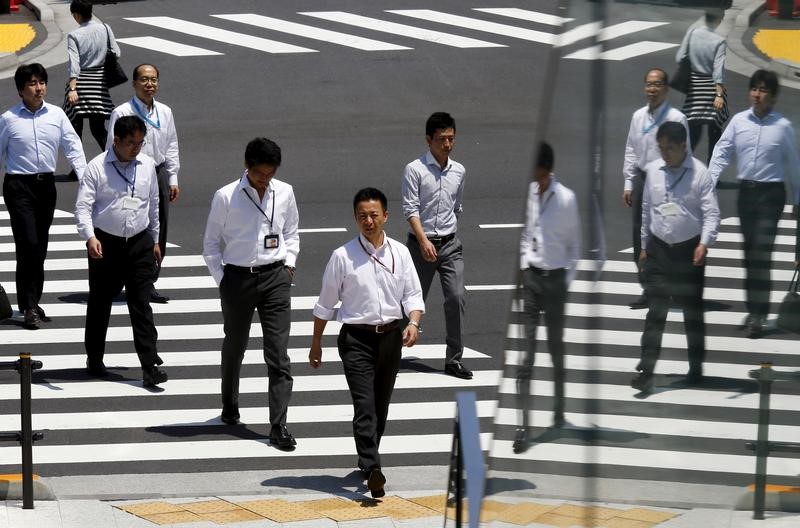By Leika Kihara
TOKYO (Reuters) - A gap in pay and working conditions between temporary and permanent employees is preventing a tightening job market from pushing up overall wages and inflation, the Bank of Japan said in a rare analysis of the country's job market.
Wages for temporary workers are "clearly on the rise" as companies struggle to lure employees, with the job market having tightened to levels not seen since Japan's asset-inflated bubble era in the early 1990s, the BOJ said.
But permanent workers' pay remains stagnant because labour unions representing these employees, who enjoy better benefits than those on the temporary roll, tend to prioritise job security over higher pay, it said in a report on Friday.
Japan's unique pay scale, where salaries rise according to seniority, also discourages job hopping and prevents a tight job market from pushing up overall wages, the central bank said.
The slow growth in permanent workers' income, which makes up nearly 70 percent of total wage-earners' income, partly explains why wage growth is subdued despite a strong economy, it said.
"Companies are taking various steps to address a shortage of labour," such as introducing robots to automate operations and cutting back on extra services, the BOJ said.
Restaurant chain operators like Royal Holdings, which used to open their outlets 24 hours, are shortening opening hours due to a paucity of staff.
Such efforts will raise labour productivity and could weigh on inflation, though the downward pressure exerted on prices will be temporary as Japan's potential growth heightens, it said.
The disparity between strong growth and low inflation is a common puzzle for global central banks though the problem is more pronounced in Japan, where inflation remains ground to a halt despite four years of aggressive money printing.
In a show of alarm over the problem, the BOJ included a rare analysis on wage and job growth in a full version of its quarterly report, which is issued a day after a summary of it that focuses on the long-term growth and price projections.
At a two-day rate review that ended on Thursday, the BOJ kept monetary policy steady but once again pushed back the timing for achieving its ambitious inflation target, reinforcing views it will lag well behind other major central banks in scaling back its massive stimulus program.
Japan's jobless rate rose to 3.1 percent in May, while the availability of jobs rose for the third straight month to reach the highest since February 1974. But core consumer prices in May rose just 0.4 percent from a year earlier, well below the BOJ's 2 percent target.
